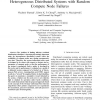Free Online Productivity Tools
i2Speak
i2Symbol
i2OCR
iTex2Img
iWeb2Print
iWeb2Shot
i2Type
iPdf2Split
iPdf2Merge
i2Bopomofo
i2Arabic
i2Style
i2Image
i2PDF
iLatex2Rtf
Sci2ools
121
click to vote
IPPS
2009
IEEE
2009
IEEE
Robust sequential resource allocation in heterogeneous distributed systems with random compute node failures
—The problem of finding efficient workload distribution techniques is becoming increasingly important today for heterogeneous distributed systems where the availability of compute nodes may change spontaneously over time. Therefore, the resource-allocation policy must be designed to be robust with respect to absence and reemergence of compute nodes so that the performance of the system is maximized. Such a policy is developed in this work, and its performance is evaluated on a model of a dedicated system composed of a limited set of heterogeneous Web servers. Assuming that each HTML request results in a ”reward” if completed before its hard deadline, the goal is to maximize a cumulative reward obtained in the system. A failure rate for each server is set relatively high to simulate its operation under harsh conditions. The results demonstrate that the proposed approach based on the concepts of the Derman–Lieberman–Ross theorem outperforms other policies compared in our expe...
Compute Nodes | Distributed And Parallel Computing | Efficient Workload Distribution | Heterogeneous Distributed Systems | IPPS 2009 |
Related Content
| Added | 24 May 2010 |
| Updated | 24 May 2010 |
| Type | Conference |
| Year | 2009 |
| Where | IPPS |
| Authors | Vladimir Shestak, Edwin K. P. Chong, Anthony A. Maciejewski, Howard Jay Siegel |
Comments (0)

